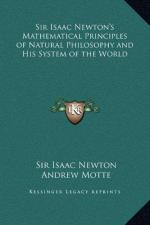|
This section contains 595 words (approx. 2 pages at 300 words per page) |

|
1642-1727
English Physicist, Mathematician, and Astronomer
Isaac Newton's combination of abilities as an experimentalist, theorist, and pure mathematician have never been surpassed, and his Philosophiae Naturalis Principia Mathematica (1687) stands as one of the greatest, if not the greatest, scientific work ever written.
Newton was born on December 25, 1642, in Woolsthorpe, England. A premature and sickly baby born after his father's death, Newton spent his youth building mechanical contrivances including water-clocks, a mouse-powered mill, and kites bearing fiery lanterns. He entered Trinity College, Cambridge, in 1661 and earned his bachelors degree in 1665, having earlier that year discovered the binomial theorem. Soon thereafter the university closed because of the plague, and Newton retired to Woolsthorpe for the next 18 months.
This period of seclusion was among the most productive of his life. By November 1665 he had discovered differential calculus and by May of the following year integral calculus. During...
|
This section contains 595 words (approx. 2 pages at 300 words per page) |

|


